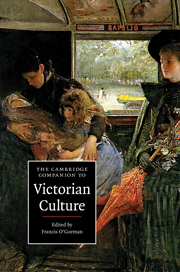13 - Victorian literary theory
Published online by Cambridge University Press: 28 July 2010
Summary
It is the fashion to try to trace things to remote origins, and show more or less plausibly how complex products have evolved from beginnings held for simple, - we say held for simple, because the egg is in reality as complex as the chick; and as Dogberry said, 'it will go near to be thought so' before long.
Readers of Victorian culture may feel that they have a pretty good idea of what Victorian literary theory looks like. Compared to our own 'complex' theories, derived from post-structural thinkers including Derrida, Foucault, Jameson, Bhabha and Butler, the Victorians' theory seems 'simple' by comparison: evaluative and prescriptive, concerned aesthetically and morally with what literature 'should' do. Skirmishes including Robert Buchanan's assault on 'The Fleshly School of Poetry' and Dante Rossetti's response, 'The Stealthy School of Criticism', for example, are entertaining to read; they present thinly veiled personal attacks on the poet coupled with sarcastic commentary on the poetry itself. Buchanan attacks Rossetti for his sonnet 'Nuptial Sleep':
Here is a full-grown man, presumably intelligent and cultivated, putting on record for other full-grown men to read, the most secret mysteries of sexual connection, and that with so sickening a desire to reproduce the sensual mood . . . that we merely shudder at the shameless nakedness. We are no purists in such matters . . . but it is neither poetic, nor manly, nor even human, to obtrude such things as themes of whole poems. It is simply nasty.
- Type
- Chapter
- Information
- The Cambridge Companion to Victorian Culture , pp. 236 - 254Publisher: Cambridge University PressPrint publication year: 2010
- 2
- Cited by

